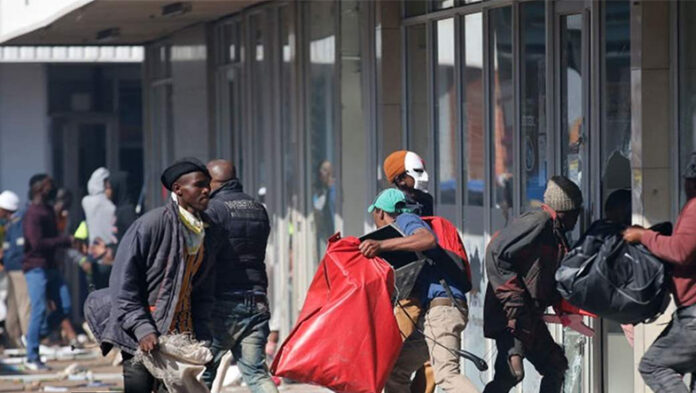Source: Amnesty International NZ
The ongoing deadly unrest tearing through parts of South Africa has been fuelled by criminal justice failures and years of impunity for violence, Amnesty International South Africa said today as the death toll continues to rise.
South African authorities cannot pretend to be surprised by the proportions this violence has reached. Authorities watched while organised groups blocked the roads, burnt properties and looted shops and factories last week
Riots began last week in Kwa-Zulu Natal, following the arrest of former president Jacob Zuma for contempt of court. The riots have since spread to Gauteng province and threatening to spill to other provinces and grown increasingly violent – at least 70 deaths have been reported so far, and there has been widespread looting and destruction of hundreds of properties. Amnesty International highlighted how past acts of violence, including the killing of foreign nationals during xenophobic violence have gone unpunished, leading to an entrenched culture of impunity.
“South African authorities cannot pretend to be surprised by the proportions this violence has reached. Entrenched impunity for past acts of violence has undermined the rule of law and resulted in a vicious cycle of violence. Authorities watched while organized groups blocked the roads, burnt properties and looted shops and factories,” said Shenilla Mohamed, Executive Director of Amnesty International South Africa.
“It is the responsibility of the authorities to ensure that this unrest is brought under control, within international law enforcement standards and in line with the country’s constitutional and international human rights obligations. The government’s action so far has been too little too late, resulting in unnecessary loss of life and the destruction of countless livelihoods.”
It is the responsibility of the authorities to ensure that this unrest is brought under control, within international law enforcement standards and in line with the country’s constitutional and international human rights obligations
More than 70 people have lost their lives during looting in Kwa-Zulu Natal and Gauteng, the epicentres of the violence. Riots have also disrupted healthcare provision and vaccination schedules as South Africa battles a third Covid-19 wave, the deadliest yet, which is overwhelming healthcare services. Food security is also under threat, and millions of dollars have been lost due to destruction of property and targeted attacks on shopping malls, distribution warehouses and factories producing essential supplies such as food.
In other parts of the country, including Northern Cape and Mpumalanga, communities have had to take on the role of protecting themselves and denounce attacks on shopping malls as a result of the state’s failure to proactively safeguard these strategic centres. In some instances, police watched while people looted shops.
“South Africa already has a huge problem of inequality, poverty and unemployment, and the unrest will only worsen this. These riots are a major threat to food security, job retention and creation,” said Shenilla Mohamed.
“South African authorities must immediately restore law and order and the rule of law, through ensuring an effective criminal justice system. Those suspected to be responsible for the violence and looting must be held accountable in fair trials.
South African authorities must immediately restore law and order and the rule of law, through ensuring an effective criminal justice system
“Unless human rights are fully and effectively respected, no one will be safe in South Africa. The rule of law and human rights are two sides of the same coin, and everyone must be treated equally and held accountable to the same laws. The government must end this lawlessness before more lives are lost.”
Background
Since unrest and violence broke out in KwaZulu-Natal and Gauteng last week, more than 70 people have died and 1,200 been arrested. Incidents of violence have also been reported in two other provinces, Mpumalanga and the Northern Cape.
The unrest began after former president Jacob Zuma handed himself over to authorities in KwaZulu-Natal, on the evening of 8 July. This came after the Constitutional Court found Zuma guilty of contempt of court and sentenced him to 15 months in prison.




